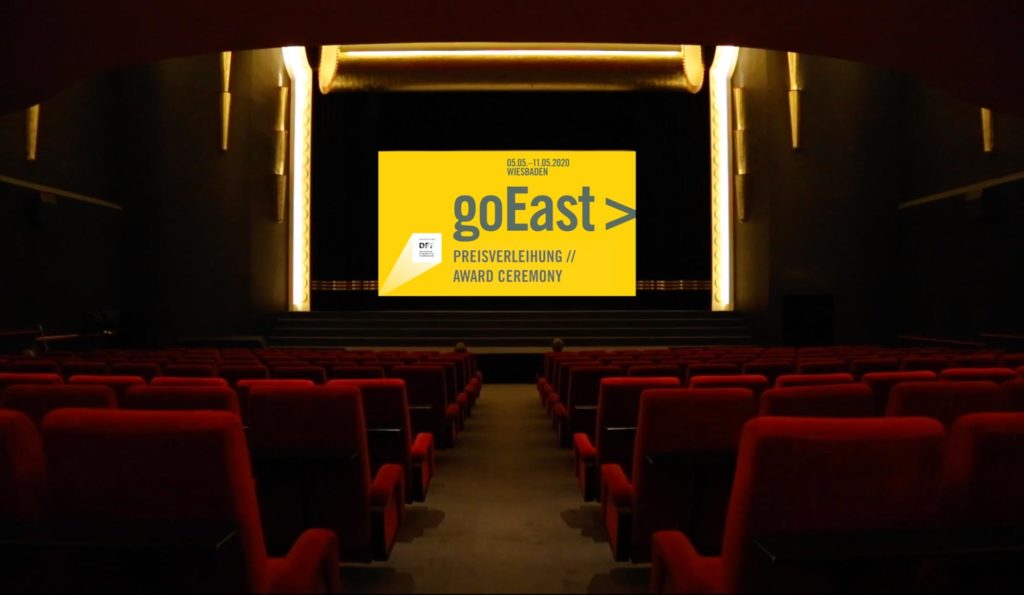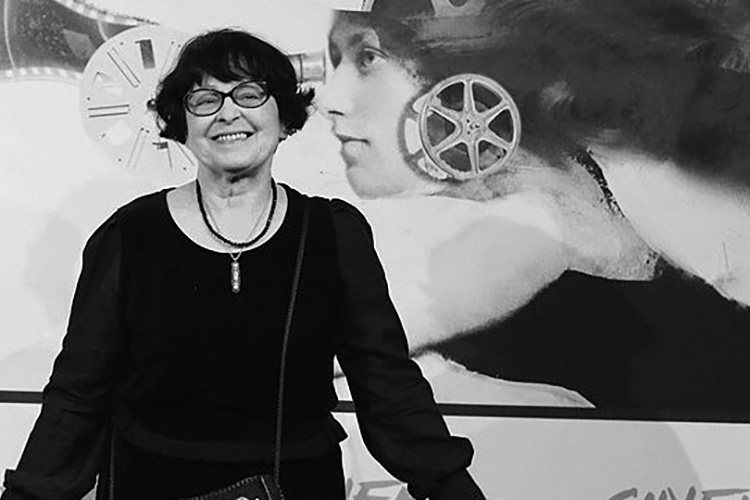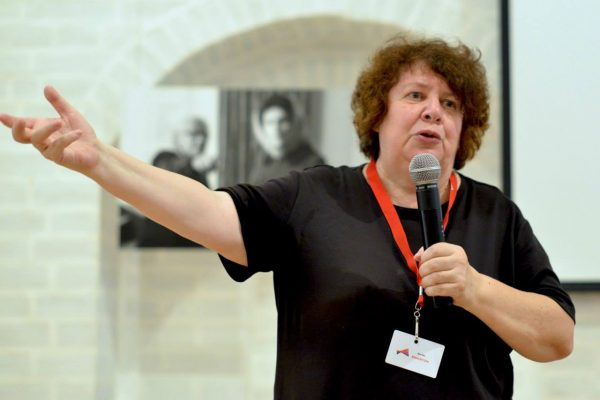One of the guests of 14. Documentarist – Istanbul Documentary Days was Heleen Gerritsen, the director of goEast, an annual film festival on Central and Eastern European cinema. During the festival we had the chance to speak with Gerritsen on the cinema of Eastern Europe, the former socialist countries and how they are perceived by the Western Europe.
The 14th edition of Documentarist – Istanbul Documentary Days, the leading independent and international documentary festival of Turkey, was held on 3-11 July 2021, with face-to-face screenings and events in addition to an online programme. One of the guests of this year’s Documentarist was Heleen Gerritsen, the director of goEast, an annual film festival on Central and Eastern European cinema, held in the German city of Wiesbaden since 2001. Heleen Gerritsen, who was born in the Netherlands, conducted her studies in Slavonic Languages and Economics in Amsterdam and St. Petersburg. Before her appointment as the director of goEast in 2017, she directed the dokumentART festival in Neubrandenburg for two years. We spoke with Gerritsen on the cinema of the former socialist countries of Europe, their female filmmakers, and the perception of Eastern European cinema in Western Europe.

In Germany, FilmFestival Cottbus, focusing on films from Eastern and Central Europe, was launched in 1991, straight after the unification. Ten years after that, your festival with the same concept was launched, on the same year when CinEast was established in Luxembourg, again with that focus. Could you tell us a little bit about the interest in the cinema of the former socialist European countries within the rest of Europe? What are the main motivations of this interest, and what is its potential contribution in the reconceptualization of the European culture?
The establishment of goEast – Festival of Central and Eastern European Film was based on a political decision. In 2001 preparations for the Eastern expansion of the European Union had already begun and in Western Germany there was a consensus that the cultures of Central and Eastern Europe (mainly of the accession countries) needed to be brought closer to Western (German) audiences, as a form of “soft diplomacy”. Ever since the 1980s, the German Film Institute (DFF), had organized Eastern European film weeks – they brought Andrzej Wajda and other classics to German cinemas – so the connection and tradition was there. The head of the institute back then, Claudia Dillmann, proposed to establish a film festival in Wiesbaden – both the local Hessen ministry of culture and the city of Wiesbaden agreed and are among our main funders ever since. Until this day Central and Eastern European culture are underrepresented in a European context, when one compares it to French, Spanish or -of course- English-language offerings.

Now, in the year 2021, when countries like Hungary, Poland and Slovenia are politically leaning towards right-wing populism, it becomes painfully obvious that the rest of Europe has been ignoring signals and developments that have been going on in these countries for a long time. In my opinion, the lack of interest in Eastern European cultures, the lack of knowledge of their languages and the meager place they get in TV and cultural programs, is partly to blame for that. A festival like goEast which increasingly takes on an interdisciplinary approach beyond film only and at the same time organizes specialized historical programs, can contribute a lot to a new European discourse, where East and West are on equal footing.
Now, when countries like Hungary, Poland and Slovenia are politically leaning towards right-wing populism, it becomes painfully obvious that the rest of Europe has been ignoring signals and developments that have been going on in these countries for a long time.
In your brilliant article on Uldus Bakhtiozina and Renata Litvinova’s latest films, in Kinokultura, you observe that these works succeed to overcome “supporting and confirming comforting images of (Russian) femininity and traditional values” (2021). The Soviet Union, despite all the dominant patriarchal notions, had some outstanding directors such as Kira Muratova, Dinara Asanova, Larisa Shepitko, among many others. What is the influence of these directors’ legacy on contemporary Russian and Eastern European female filmmakers? Do you think today’s female film directors in that part of the world are walking in the path that was opened by such directors, or would you regard this influence as limited given all the inspirations from all over the world in an era of global interaction?
Out of the names you mentioned, I would say Kira Muratova has been the most inspiring filmmaker for new generations of women directors in the Russian-speaking territories, because she re-defined the image of the soviet woman beyond the “tough cliches” – in her films women were allowed to be hysterical, negative, lazy, sexual. A complete contrast to the “wholesome” worker and mother from most classic Soviet films. In 2017 goEast organized a symposium with the title ‘Reluctant Feminism: Women Filmmakers from Central and Eastern Europe’ and one of the contradictions discussed there, is the lack of female solidarity among female filmmakers in the East – for a long time they would not call themselves feminists, but they would make films and have more opportunities than their Western counterparts.
In Russia I would say that someone like Marina Razbezhkina who opened her own film school and has mentored many young filmmakers, is more of a door-opener than classic filmmakers like Shepitko or Asanova. Looking at that huge region as a whole, the situation is quite different from country to country, I would say. A lot depends on film education. Chauvinist Poland has a great number of fantastic and successful female filmmakers, from Agnieszka Holland to Anna Zamecka, but I’m not sure that they have only made their careers because other women went before them. It’s more that there was a system in place of film education, festivals and genuine cinema culture that made the profession of film director a possible one for women as well.
What are the main differences between the cinematic output of Russia and Eastern European countries today as regards the impact of the past? In other words, in which ways do you observe the outcomes of the former asymmetry between Soviet Union and the socialist Europe in today’s filmmaking practices?
It is hard to answer in general terms. Up to a large extent many films produced in Central and Eastern Europe still react to the past: Starting in the 1990s and continuing until today, there has been a wave of anti-Soviet films in the Baltic states, Poland and Ukraine, for example, where the communist period is depicted as absolute evil. Other films (mainly Russian ones, genre films like comedies) have a more nostalgic approach. While some countries of the former so-called Eastern Bloc went through similar experiences, others had their own distinct version of socialism: Albania, for instance. Or Romania under Ceausescu. These countries tend to have their own discourses when it comes to dealing with the past – less influenced by the Russian/post-Soviet experience.
Starting in the nineties and continuing until today, there has been a wave of anti-Soviet films in the Baltic states, Poland and Ukraine, for example, where the communist period is depicted as absolute evil.
One difference which is very obvious is the fact that now there are many more film schools in the region than before. Up until 1989 the film schools in Moscow and Prague were the leading ones of the Eastern Block (and not only – cohorts of filmmakers from all over the world were guest students here) After 1989 new film educational systems were developed, influenced by western film schools and/or training programs. This of course had consequences for film language and ideology as well.

What is the extent of ‘orientalism’ in Western European film criticism in its approach to and appreciation of Eastern European and Russian cinema today? How did this ‘orientalism’ transform after the disintegration of the Soviet Union and the dissolution of the European socialism?
A very interesting question and a relevant one. I think Larry Wolff’s ideas which he put forward in his book ‘Inventing Eastern Europe’ can be applied here. When we look at orientalism as a form of othering – there certainly is a lot of that going on in Western European film criticism. One recent example was a dispute I had on social media with a leading German film critic who, in an online column, maintained that the three eastern European Berlinale jury members had given out most of the awards to films from that same region out of cronyism and nationalistic reasons.
The fact that a statement like that can be made without meeting with massive criticism is typical. It certainly is true that the same films are interpreted differently in East and West and knowledge of Eastern European history and cultures is often lacking, leading to simplified interpretations of films.
An honest discourse about the transition period in the nineties, the ‘colonization’ of Eastern Europe by Western corporations and institutions is needed in order to get this balance right.
Now that the cold war is over there is more knowledge about and exchange with Central European countries – European educational and cultural programs like Erasmus and Creative Europe MEDIA have contributed to this. But Russia remains a favorite bogeyman (politically I agree with that – Putinism is not doing the country any good). Not much has changed there since the cold war. The view on Central Asian countries and the Caucasus is drenched in orientalism – not only in the west but in Russia as well. An honest discourse about the transition period in the 1990s, the ‘colonization’ of Eastern Europe by Western corporations and institutions is needed in order to get this balance right.
Is it possible to envision new dimensions in Eastern European cinema as a result of the current refugee and migrant crisis in Europe?
The refugee crisis is a topic which has been popping up in many films recently -especially from the Balkan region. However, I would not call it “a new dimension” – rather it is a new “ingredient” for many social dramas and documentaries focusing on the individual human experience. Migration is a big topic in that context (and it always has been – from Italian neorealism to Charlie Chaplin) The changing discourse about racism, post-colonialism etc. will have its impact in the long run, I believe, but that is a global phenomenon.





